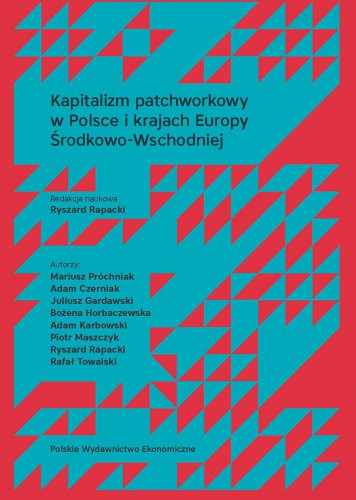Kapitalizm patchworkowy w Polsce i krajach Europy Środkowo-Wschodniej
Publication date: 2019
Place publication: Warszawa
Publication: I
Binding: paperback
Format: B5
The book presents the findings of an interdisciplinary research project set within a current of comparative studies of capitalism and carried out by a team of authors in the years 2015-2019. Assuming as their starting point the analytical framework resulting from the most recent literature, relying upon paradigms of the new institutional economics and new economic sociology, the Authors have substantially expanded and modified this scope so as to fully take into account the specificities of institutional architecture that evolved in the countries of the former socialist block.
The book presents an empirical panorama of emerging post-communist capitalism in Poland and ten other European Union member states from the Central and Eastern Europe (CEE11) – Bulgaria, Croatia, Czechia, Estonia, Hungary, Latvia, Lithuania, Romania, Slovakia and Slovenia – enabling better understanding of the nature and key distinctive features of that peculiar system. The emphasis in the research was mainly put upon the analysis of a similarity observed in the CEE11 countries between their institutional order and four models of Western European capitalism that coexist in the European Union, i.e. continental, Anglo-Saxon, Nordic and Mediterranean. In the research these models were represented by the most typical “old” Union member states to represent the respective models, which were, respectively, Germany, the United Kingdom, Sweden, and Spain/Italy. In comparative analysis an original method, developed by the Authors, was used – that of coefficients and similarity hexagons.
The findings obtained suggest that the institutional order developed in Poland and other CEE11 countries reveals most similarity to the Mediterranean model of capitalism. At the same time, however, the following are ranked, among other things, as the most distinctive properties of the post-communist capitalism in the Central and Eastern Europe: parallel institutional proximity to other models of Western European capitalism, misalignment of the “building blocks” of its institutional architecture and an evident deficit of institutions complementarity. Due to these characteristics, the post-communist institutional order in the CEE countries constitutes a new, distinctive model of capitalism, quite separate from others, previously existing in the European Union, the essence of which is best described a “patchwork capitalism”.
PRZEDMOWA
RYSZARD RAPACKI
PODZIĘKOWANIA
ROZDZIAŁ 1. BADANIA PORÓWNAWCZE NAD KAPITALIZMEM – RAMY KONCEPCYJNE I PODSTAWY TEORETYCZNE
JULIUSZ GARDAWSKI, RYSZARD RAPACKI
1.1. Wprowadzenie
1.2. Najważniejsze koncepcje i definicje
1.2.1. Instytucje
1.2.2. Zmiana instytucjonalna
1.2.3. Komplementarność instytucjonalna
1.2.4. Instytucjonalna przewaga komparatywna
1.2.5. Model kapitalizmu
1.3. Podłoże teoretyczne
1.3.1. Nowa ekonomia instytucjonalna a nowa socjologia ekonomiczna
1.3.2. Wcześni pionierzy – Max Weber
1.3.3. Rozwój badań porównawczych nad kapitalizmem po II wojnie światowej
1.4. Podsumowanie i najważniejsze wnioski
ROZDZIAŁ 2. WYŁANIAJĄCE SIĘ ODMIANY KAPITALIZMU W EUROPIE ŚRODKOWO- -WSCHODNIEJ: PRZEGLĄD WYNIKÓW BADAŃ
RYSZARD RAPACKI, ADAM CZERNIAK, JULIUSZ GARDAWSKI, BOŻENA HORBACZEWSKA, ADAM KARBOWSKI, PIOTR MASZCZYK, MARIUSZ PRÓCHNIAK
2.1. Wprowadzenie
2.2. Standardowe ramy koncepcyjne i ich zastosowania
2.2.1. Odmiany kapitalizmu
2.2.2. Różnorodność kapitalizmu
2.3. Podejścia niestandardowe
2.3.1. Perspektywa europejska
2.3.2. Polski wkład
2.4. Podsumowanie i najważniejsze wnioski
ROZDZIAŁ 3. RAMY METODOLOGICZNE
PIOTR MASZCZYK, MARIUSZ PRÓCHNIAK
3.1. Wprowadzenie
3.2. Osobliwości postkomunistycznego kapitalizmu i możliwość zastosowania standardowych podejść metodologicznych
3.3. Zastosowana metoda badawcza – współczynniki podobieństwa
ROZDZIAŁ 4. KONKURENCJA NA RYNKU PRODUKTÓW – KRAJE EŚW
A MODELE KAPITALIZMU W EUROPIE ZACHODNIEJ
MARIUSZ PRÓCHNIAK
4.1. Wprowadzenie
4.2. Zbiór danych i wykorzystane wskaźniki
4.3. Wyniki badania
4.3.1. Wyniki na poziomie grupy EŚW1
4.3.2. Wyniki dla poszczególnych krajów
4.4. Podsumowanie i najważniejsze wnioski
ROZDZIAŁ 5. PORÓWNANIE STOSUNKÓW PRZEMYSŁOWYCH I RYNKU PRACY W EUROPIE ŚRODKOWO-WSCHODNIEJ ZE WZORAMI ZACHODNIOEUROPEJSKIMI
JULIUSZ GARDAWSKI, RAFAŁ TOWALSKI
5.1. Wprowadzenie
5.1.1. Ewolucja stosunków przemysłowych w perspektywie teoretycznej
5.1.2. Wybrane typologie europejskiego kapitalizmu i stosunków przemysłowych
5.2. Zbiór zmiennych i zastosowane wskaźniki
5.3. Wyniki badania
5.3.1. Rozkłady zmiennych wejściowych i wyjściowych w krajach referencyjnych i krajach Europy Środkowej i Wschodniej
5.3.2. Kompozytowe współczynniki podobieństwa krajów EŚW11 do krajów referencyjnych
5.3.3. Wyniki analiz poszczególnych krajów EŚW11
5.4. Podsumowanie i najważniejsze wnioski
ROZDZIAŁ 6. SYSTEM POŚREDNICTWA FINANSOWEGO – ANALIZA PORÓWNAWCZA KRAJÓW EŚW I EUROPY ZACHODNIEJ
BOŻENA HORBACZEWSKA
6.1. Wprowadzenie
6.2. Zmienne wykorzystane w badaniu i źródła danych
6.3. Wyniki przeprowadzonego badania
6.3.1. Rezultaty na poziomie grupy EŚW11
6.3.2. Wyniki dla poszczególnych krajów
6.4. Podsumowanie i najważniejsze wnioski
ROZDZIAŁ 7. SYSTEM ZABEZPIECZENIA SPOŁECZNEGO – WYNIKI ANALIZY PODOBIEŃSTWA KRAJÓW EŚW DO EUROPY ZACHODNIEJ
PIOTR MASZCZYK
7.1. Wprowadzenie
7.2. Zbiór danych i wykorzystane wskaźniki
7.3. Wyniki badania
7.3.1. Wyniki na poziomie grupy EŚW11
7.3.2. Wyniki dla poszczególnych krajów
7.4. Podsumowanie i najważniejsze wnioski
ROZDZIAŁ 8. SYSTEM TWORZENIA WIEDZY – KRAJE EŚW
A ZACHODNIOEUROPEJSKIE MODELE KAPITALIZMU
MARIUSZ PRÓCHNIAK, ADAM KARBOWSKI
8.1. Wprowadzenie
8.2. Opis zbioru danych
8.3. Wyniki badania
8.3.1. Wyniki na poziomie grupy EŚW11
8.3.2. Wyniki dla poszczególnych krajów
8.4. Podsumowanie i najważniejsze wnioski
ROZDZIAŁ 9. RYNEK MIESZKANIOWY – WYNIKI ANALIZY PODOBIEŃSTWA KRAJÓW EŚW DO EUROPY ZACHODNIEJ
ADAM CZERNIAK
9.1. Wprowadzenie
9.2. Opis zbioru danych
9.3. Wyniki badania
9.3.1. Wyniki na poziomie grupy EŚW11
9.3.2. Wyniki dla poszczególnych krajów
9.4. Podsumowanie i najważniejsze wnioski
ROZDZIAŁ 10. KRAJE EŚW NA TLE EUROPY ZACHODNIEJ – PODSUMOWANIE WYNIKÓW ANALIZY PORÓWNAWCZEJ
RYSZARD RAPACKI
10.1. Wprowadzenie
10.2. Wyniki analizy empirycznej
10.2.1. Konkurencja na rynku produktów
10.2.2. Rynek pracy i stosunki przemysłowe
10.2.3. System pośrednictwa finansowego
10.2.4. System zabezpieczenia społecznego
10.2.5. System tworzenia wiedzy
10.2.6. Rynek mieszkaniowy
10.3. Najważniejsze ustalenia badawcze
ROZDZIAŁ 11. ISTOTA I NAJWAŻNIEJSZE CECHY KAPITALIZMU PATCHWORKOWEGO W POLSCE I KRAJACH EUROPY ŚRODKOWO-WSCHODNIEJ
RYSZARD RAPACKI, JULIUSZ GARDAWSKI
UWAGI KOŃCOWE
RYSZARD RAPACKI
SPIS TABEL
SPIS RYSUNKÓW
INDEKS OSOBOWY
INDEKS RZECZOWY
BIOGRAMY AUTORÓW
| Odbiór osobisty | 0 € |
| Kurier Inpost | 4 € |
| Kurier FedEX | 4 € |
| Inpost Paczkomaty | 4 € |
| Free delivery in Reader's Club | from 47 € |


